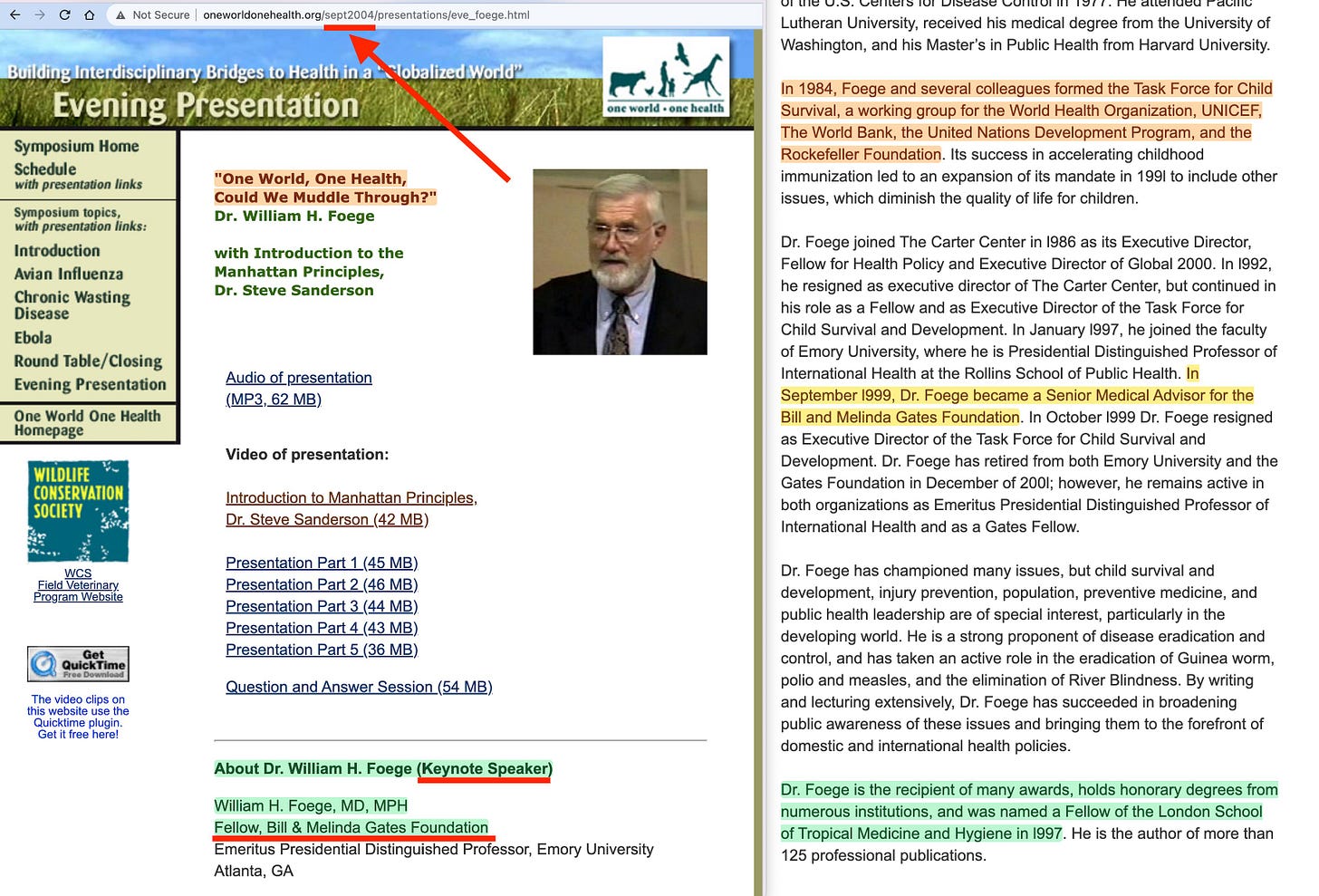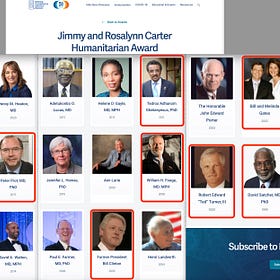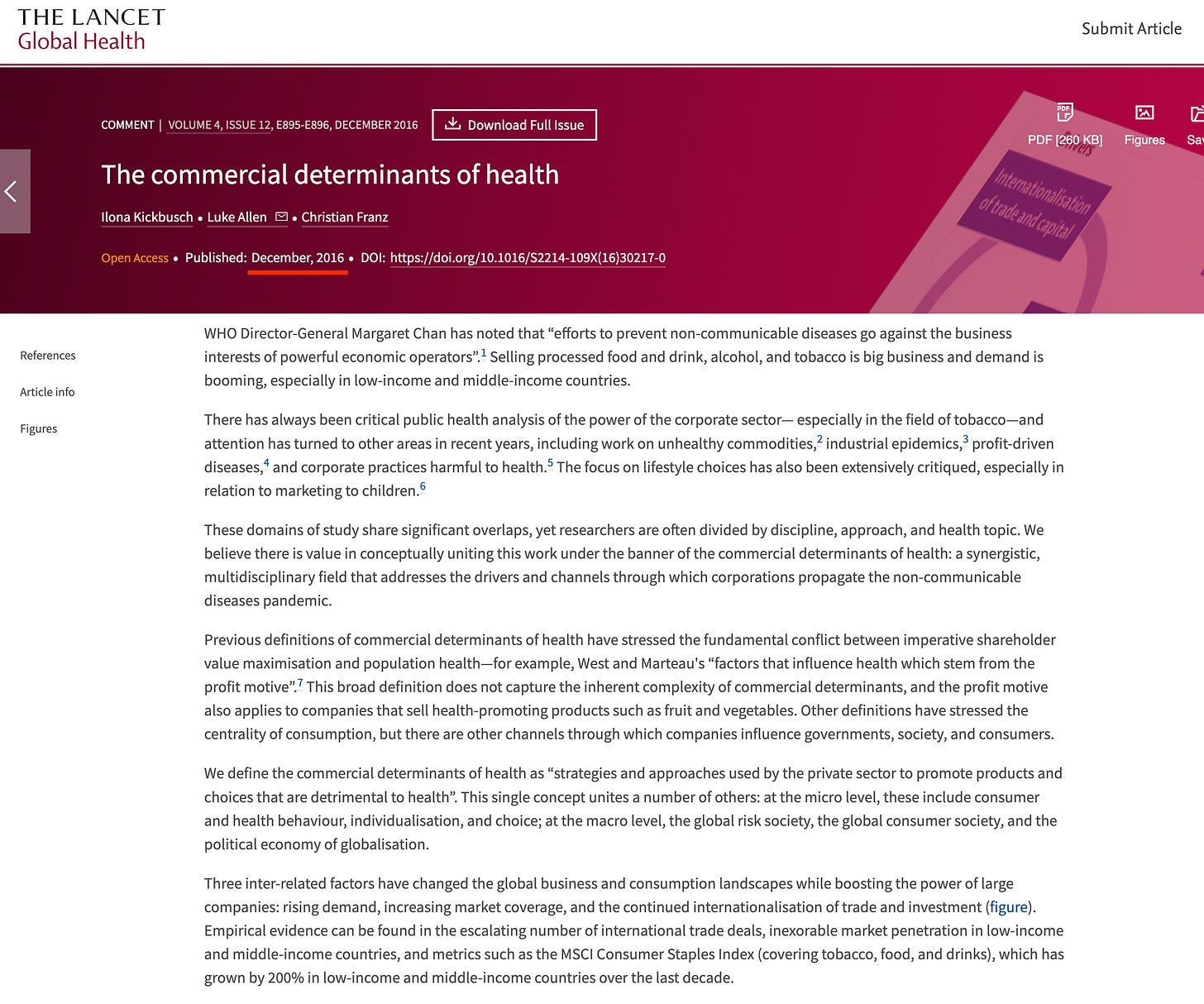In 2008, The World Health Organisation released a report titled, ‘Closing the Gap in a Generation’. It was the final report of the Commission on Social Determinants of Health.
And, much like with ‘One Health’, the genuine objective is hidden in plain view,
-
Michael Marmot was chair, and I’ll return to him in a minute. Because much like, well, most of the commissioners, they all have some deep, dark secrets lurking. A few are more obvious than others, specifically, those I underscored. More on that in a minute.
The executive summary finishes with a bold claim: ‘Social injustice is killing people on a grand scale‘, and ‘Putting right these inequities… is a matter of social justice‘.
And who should correct said? ‘… global community can put this right but it will take urgent and sustained action, globally, nationally, and locally‘. Sounds familiar, no?
Furthermore, and this should also be familiar to most -
‘Action on the social determinants of health must involve the whole of government, civil society and local communities, business, global fora, and international agencies.‘
And finally, here’s a little taster of Health-In-All-Policies.
‘Policies and programmes must embrace all the key sectors of society not just the health sector.‘
In other words, the Determinants of Health means - not health is health.
Finally, Marmot himself does us the favour of summing up quickly what each chapter comprise. For the time being, I’m really only interested in two -
‘Part 5 focuses on the critical importance of data… health equity surveillance and monitoring.‘
‘Part 6, finally, reprises the global networks… taking the social determinants of health agenda forward… change at the level of global governance and global institutions...‘
Any questions? Or should I give you a minute to sit in stunned silence and then ask again?
When I said that a number of the commissioners have stories to tell, it wasn’t a lie. Starting with Michael Marmot, he’s a Lancet Commissioner on Global Governance for Health, and furthermore a Director of the UCL Institute of Health Equity. More on ‘equity’ later.
William Foege, former Gates Foundation Fellow, was the man who delivered the Manhattan Principles back in 2004 at the Rockefeller Center, or as they’re commonly known - ‘One Health’.
In fact, here’s the keynote, as delivered by Foege in 2004.
Also, a former CDC director, credited for smallpox eradication, Gates award recipient… and One Health advocate.
And in 2020, he wrote a letter, which - astonishingly - went public. What Foege wanted, was for Trump to put the CDC in charge of Covid-19 response. There’s that stench of global governance again, because the CDC so obviously would have reported to the WHO.
Next up is David Satcher. His wikipedia page is here.
In the year 2000, ‘Healthy People 2010’ was released, with a message from Secretary of Health, Donna Shalala, and foreword by David Satcher. This document from the year 2000 carried a very, very early reference to the Social Determinants of Health.
The primary contributor for the record was Mark Smolinski, who went to Ted Turner’s Nuclear Threat Initiative shortly after, after which he founded Ending Pandemics. I covered the NTI previously here.
One Health - Part 2: Rockefeller, NTI & CORDS
Let’s have a look at the ‘Jimmy and Rosalynn Carter Humanitarian Award‘. Because in the context of One Health, it’s a remarkable list of recipients. It’s not just Farrar in 2019, Piot in 2017, but Tedros received the award in 2011, Foege in 2008, and John D Rockefeller in 2001. Although those deserve attention for sure, the three I wish to highlight are
And finally, I will take the liberty of lumping Ricardo Lagos and Amartya Sen in with one another, because that link is shared. In fact, I wrote a substack article on expressly this a few months back. Yes, really. They are both members of Collegium International, a Club of Rome linked organisation with a stated objective of World Governance.
Global Governance strikes back.
The Collegium International
Right as you think you’ve established a root, someone springs something upon you, which make you realise you’re not quite at roads end just yet. What a trip this has been. Yesterday, I tracked down the One Health approach back to the Department of Homeland Security under Michael Chertoff and 2005. But, within hours,
-
Before continuing, I will state that I could continue in the same vein with most if not all of the contributors, of which virtually all fit the common hard-left mould — but I hope I’ve proved my point. I do want to quickly note that there is one major omission here, who clearly should have been on that panel. Someone who’s dedicated her life to Global Health Governance.
Ilona Kickbusch.
Here she is, in her own words, in 2002. We’ll return to her in a bit.
-
Back to the WHO report. And, er, yeah — it rapidly disintegrates into purebred Marxism.
The report demands that we need to reorganise society, to one with a strong public sector, and a strengthened government. This ain’t conservatives talking.
It furthermore claims that ‘the inequity is systemic’, that ‘every aspect of the government and economy has the potential to affect health and health equity’, and that ‘policy coherence is crucial’.
To solve it all, we need ‘good global governance’ involving the ‘international community’, which must ‘place fairness at the heart of development’.
Only then is ‘health equity possible’.
I know what comes next, years down the line as we rebuild; some utter twat suddenly deciding to blurt out ‘real health equity has never been tried before’, right?
Chapters 3 and 4 in the book outline that in order for communi… er, health equity to work, the SDoH framework must be in place. Furthermore, the report demands that ‘all children are registered at birth’, which ties in with SDG 16.9 (digital identity), that ‘national and global health equity surveillance systems with routine collection of data on social determinants of health inequity‘.
However, returning to the prior page - and this is always, always the case with these Marxist types - ‘evidence needs to be judged on fitness for purpose‘.
So why the need for the SDoH health equity surveillance in the first place if some good, reliable party member will judge me as he sees fit, anyway? Golly, almost seems as though this has nothing to with with health at all!'
Regardless, naturally the principles of SDoH should be ‘incorporated into medical and health training, and health literacy more widely’.
Finally, we have a list of actors, and… yeah… if you’ve read One Health literature, this is essentially identical. A few lines worth pointing out in this regard -
‘… coherence in global monitoring and action…‘ - ensures global data is compatible, which will allow global governance, and hence, drive action.
’… improved participation of UN Member States in global governance…’
’… establishment of national health equity surveillance systems in Member States…’
’… health equity at the highest level of government…’
I very much hope you get the gist from all of this, as it should be bloody obvious.
Global surveillance, global governance, run from WHO offices in Switzerland… and all of this is entirely in line with One Health recommendations.
I will outline a few final pages here, but I fail to see the point beyond that. No further comment necessary.
-
Now, I could finish here, but I won’t. Because the entire reason I decided to start writing is because I located a different paper - by Ilona Kickbusch.
You see, in order to ensure people stay confused, it’s important to keep moving. The paper above invited the understanding that the ‘science’ was incomplete, but in 2012 the paper I found starts off with this -
‘If we were to rewrite the Ottawa Charter 25 years later I would focus on five key determinants of health that our societies need to address: the political, the commercial, the social, the environmental and the behavioral determinants of health.‘
Oh wow. The ‘science’ has determined that not just the Social Determinants of Health exist, in fact, there are five whole subsets of ‘science’ which all need to be monitored. To protect you.
Lucky us!
I will return to this paper in a minute, but let’s just go through these exciting new additions to the ‘science’.
First, let’s address the ‘Political Determinants of Health‘. Here it is. Naturally, it’s about health inequity! Hooray, they really do care about us! All of this is to protect us!
Next up, the ‘Commercial Determinants of Health‘. This fabrica-… er, ‘science’ was even published by the journal with an impeccable reputation! And penned by the master, Ilona herself! Such fortune!
Then we have the ‘Environmental Determinants of Health‘, here you go.
Finally, we have the ‘Behavioral Determinants of Health‘. I can barely keep up with all of this ‘science’.
But even more good fortune came along, because others even invented more exciting additions, such as the ‘Commercial Determinants of Health‘ - again by the Lancet, so you simply know it’s top notch research.
Did I say invented? Apologies, I meant discovered.
The final newly intent-… discovered addition, is by another noted top, top woman. Heidi Larson herself. It’s the ‘Emotional Determinants of Health‘, again pushed by the Hydroxychloroquine experts, the Lancet.
So you see, a whole lot of health inequity surveillance needs to be done to ensure that this time, we’ll get real commun- wait, justice and health equity.
But before I return to Ilona’s report, there are a few meta reports, which ensure you understand that these are all to be considered together. Well, or as the case is, not be considered together, as all evidence needs ‘to be judged on fitness per purpose’ per Michael Marmot and WHO, 2008. Here we have four different categories, all merged. There are others, I won’t source further as I’m sure you catch my drift.
-
But back to Ilona’s 2012 paper, because when you study it closer, the final paragraph deserve a closer look.
‘The voices are increasing that call for a ‘radical shake up’ of public health and health promotion: ‘Marmot's focus on the social determinants of health needs to be matched with an equal concern for the commercial determinants of health’ writes Gerard Hastings recently in the BMJ. (Hastings, 2012) I would add that this needs to be matched with a concern for the political determinants of health—and above all the interface between these determinants and their impact on how health is created in the context of our everyday lives. This will significantly change the role of health advocates, ministries of health and the World Health Organization. A new way of joining forces across separate health issues and organizational silos is needed. Positioning health and framing our agenda in relation to the key determinants—political, commercial, social, environmental and behavioral—could help us move the agenda forward.‘
And finally, a footnote. It’s a book by Ilona, and the WHO. Here it is.
In short, this is about massaging the idea of ‘global governance’ into the collective heads of the proles. It’s the slow, slow, slow, yet stedy approach which ensured that covid-19 was just two weeks, just night clubs, just pubs and restaurants, just school, just going outside, just taking a vaccine. But on a much, much larger scale.
It also filters in ‘global interdependence’, which I’ve covered in this past, because it links straight up with central banks, and communism - here.
Communism: Declaration of Interdependence
There’s only 63 until the next global ‘interdependence day’. So, put the date in your calendar. September 12, 2023
The report is fairly predictable, and I won’t spend much time cover it. However, what IS of interest is a casual comment on page 16 -
‘According to the Commission on Global Governance (1995)…‘
This is one of those reports which the left is always busy claiming is conspiracy theory (hence don’t look).
But before we get there, let’s finish off the book with a few final nails in the coffin that this could, somehow, be about something else. That we are ‘missing context’ or whatever the corrupt ‘fact’ ‘checkers’ claim these days when faced with correct but enormeously inconvenient information, which simply must be censored.
Now please do tell me what ‘context’ is ‘missing’ from that.
-
Now, the ‘Commission on Global Governance‘. Co-chaired by Swedish Prime Minister Ingvar Carlsson, and former Commonwealth Secretary-General Shridath Ramphal. So far, nothing conspiratorial here.
The output of the commission was a book, titled ‘Our Global Neighbourhood‘. Unfortunately, I haven’t yet found a PDF, so this will have to do instead. It’s an interactive webpage book. Joy!
Let’s head straight to Chapter 5 - ‘Reforming the United Nations‘.
‘Global governance is about a varied cast of actors: people acting together in formal and informal ways, ... But we also noted that a vital and central role in global governance falls to people coming together in the United Nations, aspiring to fulfil some of their highest goals through its potential for common action.‘
‘… we do not subscribe to the notion that the UN should be dismantled to make way for a new architecture of global governance. Since it is not the Charter that has failed but the policies and practices of its members, much of the necessary reform of the system can be effected without amending the Charter--provided that governments have the will to inaugurate real change. The few amendments we propose will themselves help create an environment favourable to a return to the spirit of the Charter. As member states celebrate the UN's fiftieth anniversary, they should be animated by the spirit of the Charter in seeking change.‘
Let’s now head to Chapter 4; ‘Managing Economic Interdependence‘.
Interdependence. My favourite type of communism.
… ‘common good’… ‘consider the impact of their actions’… ‘promote equity, including gender equity‘ (well, the UN certainly listened to that advice)… ‘sustainable development‘ (and do take note of this being released in 1995)… and…
‘In an increasingly interpedendent world… notions of territoriality, independence, and non-intervention have lost some of their meaning‘.
Pretty clear what the intent is here.
Chapter 1; ‘A New World‘ - positively coming across somewhat Club of Rome’esque.
Climate change, resource depletion, sustainability, equity, human rights, … the world needs a new vision - one of common concern and shared destiny.
Will anyone seriously table an argument that this isn’t expressly what it appears?
-
I guess I could finish it here, but there are several unfinshed items in this discovery. I’m going to leave the Ottawa Charter, the Declaration of Alma-Ata, and why the words ‘equity’ and ‘justice’ are completely meaningless — because that’s the topic for a rainy day.
But there is one thing I do want to loop in. Perhaps not exhaustively, that’s to come. Think of it as a preview.
See you later.



































Thanks so much for this.
Yes, at bottom that's just obscure bureaucratic entities no one has heard of up until recently trying to usurp unlimited power under the guise of "public health".
Notice the fallacious statement right at the get go: ‘Social injustice is killing people on a grand scale‘, and ‘Putting right these inequities… is a matter of social justice‘.
Inequality and social injustice understood as unequal outcomes/societal positions *cannot* cause anything. This is a category mistake, or a nonsensical statement. inequality is a *relational* property obtaining between the position of two or more people/groups: i.e., the relation between one person being, say, at a level of income/welfare X, and the other at the level of X +10. In itself, this can't cause anything, let alone kill people. If anything, it's the (absolute) state of the first person here that causes him/her to be killed, not how it relates to the state of the second person. And that's without even getting into the huge assumptions there about who's responsible for person 1 being in the state that s/he is in, or who is obligated to correct the situation.
These kinds of grandiose documents are absolutely rife with these thoroughly illogical and nonsensical statements. They're non-starters that shouldn't have been taken seriously, but alas, we're at a point where we must take them seriously because they have been promoted well beyond what their content justifies.
Rev 18:23: all nations were led astray